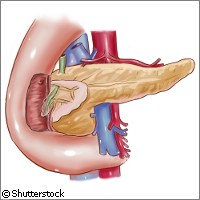European researchers offer new formula to tackle pancreatic cancer
A new development in the fight against pancreatic cancer will give hope to sufferers of this silent, yet deadly, disease. Scientists have developed a new form of chemotherapy that destroys new blood vessels that grow around tumours. The results were presented at the recent Congress of the European Society for Medical Oncology (ESMO) in Stockholm, Sweden. One of the world's most silent diseases known to mankind is pancreatic cancer. It is silent because no red flags pop up; early pancreatic cancer typically does not cause symptoms, and when they do emerge, they are non-specific and diverse (e.g. depression, weight loss and abdominal pain). Only when the cancer hits an advanced stage are patients diagnosed with the disease. Experts say pancreatic cancer affects more than 60,000 people in Europe each year. The prognosis of this disease, for most, is rather dismal; less than 5% of those suffering from it are still alive five years after diagnosis. But thanks to this latest development, there is hope for many sufferers. Led by Karolinska Institutet's Professor Matthias Löhr, the research team investigated the efficacy and safety of three different doses of cationic lipid complexed paclitaxel (EndoTAG-1). The researchers administered the formulation two times each week, in combination with weekly infusions of gemcitabine, compared to gemcitabine alone, in 200 patients with pancreatic adenocarcinoma. 'EndoTAG consists of charged particles that bind preferentially to the fast-growing endothelial cells in new blood vessels formed by tumours,' explained Professor Löhr. 'The drug, paclitaxel, is then released and thus directly reaches an important target in tumours, i.e. the vessels,' he added. 'Paclitaxel itself is not very efficient in pancreatic cancer.' Once the drug attacks the tumour blood vessels, the nutrient supply of the tumour tissue is reduced, thus curtailing the growth of the tumour. The research team found that by treating the patients with the combination of EndoTAG-1 and gemcitabine, an anti-cancer drug, their average survival time increased considerably. Patients treated with the combination drug survived up to 13.6 months, against patients who were given gemcitabine alone. The latter group's survival was on average 7.2 months. 'These results are the best I have ever seen in palliative treatment in pancreatic cancer,' remarked Professor Löhr. 'The results are really excellent and a phase III study is in the making.' Experts say nearly all patients suffering from pancreatic adenocarcinoma eventually die, making it the fifth common cause of cancer-related mortality. Based on previous research, pancreatic adenocarcinoma is a genetic disease; its evolution is the result of a progressive accumulation of molecular abnormalities in the pancreatic ducts.
Countries
Sweden



